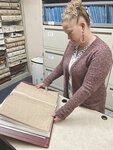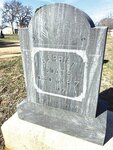

Amongst the hundreds of record books located in the basement of the Coryell County Clerk’s Office, one book in particular recalls the forgotten past of early day Coryell County.
In a book labeled Mortgage Record Book A, with another label below it, which read “Slave Records,” there was a list of approximately 18 slave owners in Coryell County between 1854 and 1864. The 1860 U.S. Census Slave Schedules for Coryell County reveal that approximately 396 slaves were living in the county while the free population was listed as 2,360 – 81 of which were slaveholders. Compared to other areas, Coryell County residents owned relatively few slaves.
In addition to the slave transactions, the Mortgage Book also included the sale of cattle and other property. According to local historian, Sherry Lawrence, slaves were nothing more than property.
“Slaves were considered to be personal property like livestock or crops; and the sale or trade of slaves was recorded in the same Coryell County record book as the sales or trades of personal property between individuals,” Lawrence said.
She explained that in the slave records the sale of a slave included their first name, sex, age, complexion, soundness of mind and body, and always included the statement that they were a “slave for life.”
Amid all the names and documents was a record for the sale of a young woman named Harriet. She was listed as 19 years of age and was owned by Coryell County resident William Duval Coates. He in turn sold her to J.H. Patterson for $1,000 in January of 1860. The previous year, Robertson had purchased a woman named Melinda who was about 24 years old. As far as it is recorded, these two women were the only slaves owned by the Robertson family.
Little is known about the young woman named Harriet. In 1850, she was listed in the slave schedules of Harrison County, Mississippi. The records indicated that she had been born in Mississippi and was owned by the Coates family. She was also one of eight slaves owned by the family. Just prior to 1858, the Coates family left Mississippi and traveled by wagon to Coryell County. In later years, Harriet would recall the move to Texas saying she had walked all the way from Mississippi to the Leon River in Coryell County behind a covered wagon. Within a few short years after settling in the Gatesville area, Coates sold young Harriet to the Robertson family.
Harriet, who assumed the surname of her owner, “Coates,” remained with the Robertson family, who eventually hired her out to the James Saunders family, as a housekeeper. She continued to work for the family even after she was freed following the Civil War. According to Lawrence, the family provided Harriet and her children with a cabin behind the Saunders home on Main Street and later bought a house for her in the Black residential area.
Harriet Coates died on March 7, 1907, in Gatesville and was buried at Oak Grove Cemetery. Her tombstone only records her name and the date of her death, since a slave’s actual birthdate was often unknown and could only be estimated. The 1900 U.S. Federal Census for Coryell County does list her as being “about” 70 years of age, which would have made her birth year as being around 1830.
The story of Harriet Coates was typical of many enslaved African Americans. Of the 38 slaves listed as being bought and sold and recorded in the courthouse’s old Chattel Mortgage Book, their stories will go unknown, unrecorded, and will remain a mystery in part of the county’s forgotten history.